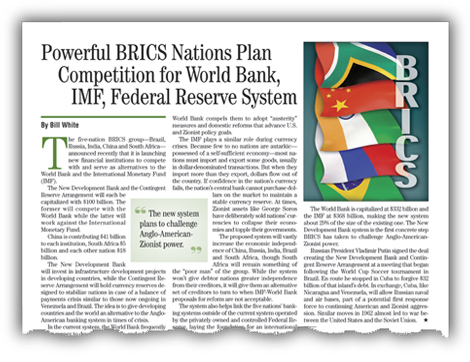
By Bill White —
The five-nation BRICS group—Brazil, Russia, India, China and South Africa—announced recently that it is launching new financial institutions to compete with and serve as alternatives to the World Bank and the International Monetary Fund (IMF).
The New Development Bank (NDB) and the Contingent Reserve Arrangement (CRA) will each be capitalized with $100 billion. The former will compete with the World Bank while the latter will work against the IMF.
China is contributing $41 billion to each institution, South Africa $5 billion and each other nation $18 billion.
The NDB will invest in infrastructure development projects in developing countries, while the CRA will hold currency reserves designed to stabilize nations in case of a balance-of-payments crisis similar to those now ongoing in Venezuela and Brazil. The idea is to give developing countries and the world an alternative to the Anglo-American banking system in times of crises.
In the current system, the World Bank frequently loans money to developing nations, and when these nations have difficulty repaying these loans, the Bank compels them to adopt “austerity” measures and domestic reforms that advance American and Zionist policy goals.
The IMF plays a similar role during currency crises. Because few to no nations are autarkic—possessed of a self-sufficient economy—most nations must import and export some goods, usually in dollar-denominated transactions. But when they import more than they export, dollars flow out of the country. If confidence in the nation’s currency fails, the nation’s central bank cannot purchase dollars on the market to maintain a stable currency reserve. At times, Zionist assets like George Soros have deliberately sold nations’ currencies to collapse their economies and topple their governments.
The proposed system will vastly increase the economic independence of the BRICS nations, though South Africa will remain something of the “poor man” of the group. While the system won’t give debtor nations greater independence from their creditors, it will give them an alternative set of creditors to turn to when IMF-World Bank proposals for reform are not acceptable.
The system also helps link the five nations’ banking systems outside of the current system operated by the privately owned and controlled Federal Reserve, laying the foundation for an international network immune to United States interference and banking sanctions.
The World Bank is capitalized at $332 billion and the IMF at $368 billion, making the new system about 29% of the size of the existing one. The NDB system is the first concrete step BRICS has taken to challenge Anglo-American-Zionist power.
Russian President Vladimir Putin signed the deal creating the NDB and CRA at a meeting that began following the World Cup Soccer tournament in Brazil. En route he stopped in Cuba to forgive $32 billion of that island’s debt. In exchange, Cuba, like Nicaragua and Venezuela, will allow Russian naval and air bases, part of a potential first response force to continuing American and Zionist aggression. Similar moves in 1962 almost led to war between the U.S. and the U.S.S.R.

Bill White is a freelance journalist and publisher based in Florida. He has also written articles for THE BARNES REVIEW (TBR) magazine. You can write him at: William A. White 201400005514 Seminole County Jail 211 Bush Blvd Sanford FL 32773.

EIR NEWS – The LaRouche Movement for a New Glass Steagall Law against Collapse and a total reform of the financial markets
We must hold our thumbs up to the BRICS member states as long as they stand for our human liberties. Once they have too many Jews or Zionists onboard, we must demand their removal and return to us, the common people base and rights!!!